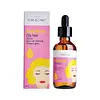Typology Targeted Blemish Serum with 2% Salicylic Acid + 1% Zinc Versus Puca – Pure & Care Scalp Serum
What's inside
What's inside
 Key Ingredients
Key Ingredients

 Benefits
Benefits

 Concerns
Concerns

 Ingredients Side-by-side
Ingredients Side-by-side

Water
Skin ConditioningGlycerin
HumectantPropanediol
SolventAlcohol
AntimicrobialPanthenol
Skin ConditioningHamamelis Virginiana Leaf Extract
Skin ConditioningCopper Tripeptide-1
Skin ConditioningSaccharide Isomerate
HumectantBeta-Glucan
Skin ConditioningArginine
MaskingLactic Acid
BufferingCitric Acid
BufferingCellulose Gum
Emulsion StabilisingHexylene Glycol
EmulsifyingHydroxyethylcellulose
Emulsion StabilisingHydroxyacetophenone
AntioxidantSodium Citrate
BufferingSodium Hydroxide
Buffering1,2-Hexanediol
Skin ConditioningPolysorbate 20
EmulsifyingPhenoxyethanol
PreservativeEthylhexylglycerin
Skin ConditioningWater, Glycerin, Propanediol, Alcohol, Panthenol, Hamamelis Virginiana Leaf Extract, Copper Tripeptide-1, Saccharide Isomerate, Beta-Glucan, Arginine, Lactic Acid, Citric Acid, Cellulose Gum, Hexylene Glycol, Hydroxyethylcellulose, Hydroxyacetophenone, Sodium Citrate, Sodium Hydroxide, 1,2-Hexanediol, Polysorbate 20, Phenoxyethanol, Ethylhexylglycerin
Ingredients Explained
These ingredients are found in both products.
Ingredients higher up in an ingredient list are typically present in a larger amount.
1,2-Hexanediol is a synthetic liquid and another multi-functional powerhouse.
It is a:
- Humectant, drawing moisture into the skin
- Emollient, helping to soften skin
- Solvent, dispersing and stabilizing formulas
- Preservative booster, enhancing the antimicrobial activity of other preservatives
Citric Acid is an alpha hydroxy acid (AHA) naturally found in citrus fruits like oranges, lemons, and limes.
Like other AHAs, citric acid can exfoliate skin by breaking down the bonds that hold dead skin cells together. This helps reveal smoother and brighter skin underneath.
However, this exfoliating effect only happens at high concentrations (20%) which can be hard to find in cosmetic products.
Due to this, citric acid is usually included in small amounts as a pH adjuster. This helps keep products slightly more acidic and compatible with skin's natural pH.
In skincare formulas, citric acid can:
While it can provide some skin benefits, research shows lactic acid and glycolic acid are generally more effective and less irritating exfoliants.
Most citric acid used in skincare today is made by fermenting sugars (usually from molasses). This synthetic version is identical to the natural citrus form but easier to stabilize and use in formulations.
Read more about some other popular AHA's here:
Learn more about Citric AcidPropanediol is an all-star ingredient. It softens, hydrates, and smooths the skin.
It’s often used to:
Propanediol is not likely to cause sensitivity and considered safe to use. It is derived from corn or petroleum with a clear color and no scent.
Learn more about PropanediolSodium Hydroxide is also known as lye or caustic soda. It is used to adjust the pH of products; many ingredients require a specific pH to be effective.
In small amounts, sodium hydroxide is considered safe to use. However, large amounts may cause chemical burns due to its high alkaline.
Your skin has a natural pH and acid mantle. This acid mantle helps prevent harmful bacteria from breaking through. The acid mantle also helps keep your skin hydrated.
"Alkaline" refers to a high pH level. A low pH level would be considered acidic.
Learn more about Sodium HydroxideWater. It's the most common cosmetic ingredient of all. You'll usually see it at the top of ingredient lists, meaning that it makes up the largest part of the product.
So why is it so popular? Water most often acts as a solvent - this means that it helps dissolve other ingredients into the formulation.
You'll also recognize water as that liquid we all need to stay alive. If you see this, drink a glass of water. Stay hydrated!
Learn more about Water